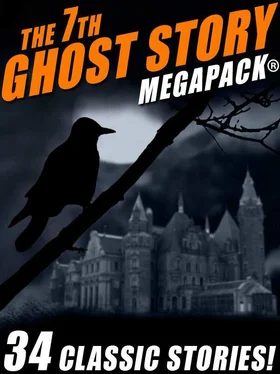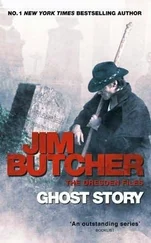“Well, Mr. Keel!”
Gordon leaped out of his memories to find Dr. Green by his bed. Dr. Green was a tall brisk man, even brisker than Nurse Rawlins. Tonight Dr. Green had brought another doctor with him, a solemn little man with penetrating eyes. Nurse Rawlins hovered behind them, her brisk little cough said, see what I told you, Doctor ?
“You haven’t touched your dinner, Mr. Keel,” Dr. Green chided. His reproachful smile identified Gordon with a spoiled child.
Gordon’s eyes leaped to the food tray.
He retched. He longed to tell them to get out, all of them, as he had Nurse Rawlins.
But if he did they might take drastic measures. They might send him to an institution for the insane, and he was not insane.
The little man with the penetrating eyes touched Dr. Green’s arm. He gestured Nurse Rawlins to take the tray and herself out of the room. She obeyed with awe, and that told Gordon that the little man was important.
Dr. Green confirmed this. “Mr. Keel, this Dr, Ramsey Folliger. Do you know who Dr. Folliger is, Mr. Keel?”
Gordon scowled at the little man. “He’s a psycho doctor. But I’m not crazy, Doctor! I’m not!”
Dr. Folliger brushed Dr. Green behind him. He shook his head and smiled at Gordon. “We don’t think that at all, Mr. Keel.
But frankly, we do think that there is something, some mental block, at the bottom of this obsession of yours.”
Gordon laughed and sobbed at the same time. “You can’t help me, Dr. Folliger.”
“All the same,” and the little man fixed him with his penetrating eyes, “I intend to try.”
* * *
In the end Gordon told Dr. Folliger everything. Dr. Folliger was that kind of a man. Maybe it was his eyes. When he looked at Gordon and asked questions, he had to answer them truthfully. He had to tell Dr. Folliger just what went on in his mind. Oh, he was clever. Within two hours after Dr. Green stepped back out of Gordon’s room, Dr. Folliger had the whole story…
That letter about Cousin Grey Ellis had changed Gordon’s life. It put wealth within his grasp. It had traveled quite a bit before it reached him. If only it never had! He might have been happy. After awhile that hungry ache in his heart for Esther would have gradually faded away, he would have become floor walker at Tilson’s and more than likely have married Cora Anderson, who made sheep’s eyes at him from behind the ribbon counter.
Cousin Grey Ellis had that letter written just before he died. In it he willed Gordon something. No, not his money. He willed Gordon his Cousin Aubrey Ellis. Aubrey was Grey’s son and it seemed that he—
In telling Dr. Folliger about it, Gordon relived the whole thing. These memories were all too vivid, etched on his mind with inexorable acid. He remembered hiking down the wet dirt road off the highway, from the cut-off where the Greyhound bus dumped him and his three suitcases. It was evening. It had rained. So it did rain in California! He remembered his first sight of that big brown house, half-hidden behind those curiously warted palms with their funny drooping fronds. He had noticed how the brown paint had peeled off the rococo veranda in great patches, how the shingles were loose on that little tower leaning across the lead-gray sky. How the concrete sidewalk was crumbling in places so that tufts of new spring grass thrust through the cracks. Cousin Grey Ellis had money, lots of money. Yet he persisted in living in this big old country house, which he didn’t even keep up.
Then—Cousin Aubrey.
He was sitting at the dining room table in an arm chair. The arm chair had a strap across it, so he wouldn’t fall out. He sat there drooling over a plate of fricasseed chicken. His gaping mouth was sloppy with white gravy and bits of chicken, his vacant eyes gawked up at Gordon with idiotic disinterest. He made little puppy noises at the large woman who had set down his spoon to welcome Gordon.
“Can’t he even feed himself?” Gordon stared at seventeen-year-old Cousin Aubrey with sharp repugnance. Gordon had great respect for fricassee of chicken, to see it slopped over like that repelled him.
“Nope.” The big woman adjusted a hairpin in her graying knot, and then started putting on her cloth coat, which was handy on a chair by the oval dining room table. “Can’t eat, nor talk, nor walk. Can’t do nothin’ for himself.” She eyed Gordon sharply. “Case you want to know who I am, I’m Nellie Fawcett. I’ve been Grey Ellis’s nearest neighbor for twelve years. I do his cleaning, and help out. I been takin’ care of Aubrey since Grey died.” She pierced a long pin through her dowdy black hat with emphasis. “Am I glad to see you. I’ve got my own kids to feed. Aubrey!” She shook the lackwit’s shoulder. “This is your Cousin Gordon. He’s come all the way from Denver to take care of you. Won’t that be nice?” She turned back to Gordon with a shrug. “He don’t understand, but I think he likes to be talked to. After you’ve fed him, take his clothes off and bathe him, and put him to bed. Oh, yeah, there’s a twin baby buggy in the parlor. He likes to be took for a ride in it every afternoon. You’ll find out what else there is to do for yourself. Anything comes up, give me a buzz. The number’s tacked up on the almanac calendar by the phone. Phone’s in the hall, by the cellar door.”
She gave Aubrey a last look. “Goodbye, Aubrey. Be a good boy.”
Gordon soon lost his own delicate taste for food, feeding Aubrey, watching him slobber over every spoonful, wiping the drool off his chin. Whatever sympathy for him existing in Gordon’s emotions was soon dissipated as weeks went by, as he watched Aubrey whine greedily when his food was brought in, when he washed and toweled that limp white body or wheeled it down the road in that strong, oversize baby buggy and cleaned up the messes resulting from feeding.
Cousin Grey Ellis’s will was studiedly tantalizing. It hinted of a rosy future for Gordon after Cousin Aubrey passed on. Until such time the purse strings were held in check by the local bank. Only enough money was doled out to provide for their immediate needs and, according to the terms of the will, Gordon could not foist Aubrey off on some paid attendant, either. No, he had to take care of him personally.
Esther’s letters alone kept Gordon at his task. The thought that someday Aubrey would die, and then they could be married and live happily ever after helped. But Aubrey was just seventeen. His doctor informed Gordon he might live a long, long time. By then the money wouldn’t matter.
Feeding Aubrey was the worst. Gordon approached each succeeding meal with reluctance and horror. Let Aubrey whine. Let him starve…
Why not ?
Why not assist Aubrey out of his futile existence? He was no good to himself, no good to anyone—alive. He was a repulsive burden. Dead he would render Gordon a beautiful service, he would make it possible for Gordon to marry Esther and live happily ever after.
It was easy. Gordon didn’t even have to change his routine. He simply chose the day after the grocery truck delivered the week’s provisions to get himself locked in the cellar. Nobody visited the Ellis house except Nellie Fawcett, and she only occasionally. The old fashioned cellar with the big refrigerator in it had a stout oak door, and on this door was a heavy snap-lock. If someone forgot to unsnap the lock when they went down the wind from the hall window might easily blow the door shut and lock that someone in the cellar. There was only one window, high up, and it was barred against roving animals and burglars. There were no cutting tools in the cellar, they were kept in the old carriage house.
Gordon was very careless that day. He went down in the cellar to fetch some fruit to tempt Aubrey’s appetite and he forgot to unsnap the lock. The door blew shut. Gordon was locked in the cellar for five whole days. There was plenty for him to eat down there, but when Nellie Fawcett let him out they found Cousin Aubrey still sitting by the oval dining room table where Gordon had left him; with a plate of five-day-old beef casserole in front of him, quite dead.
Читать дальше












